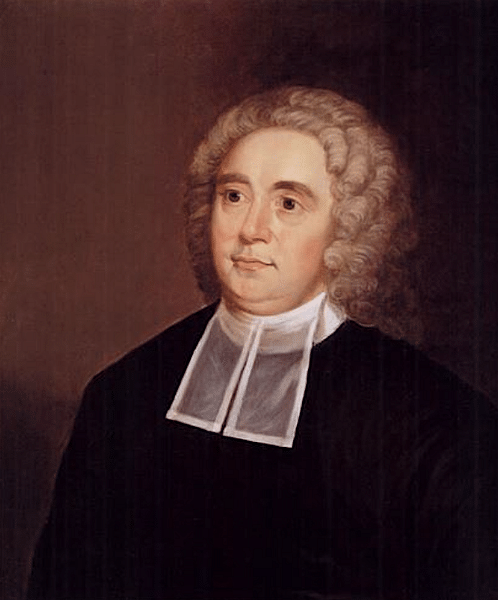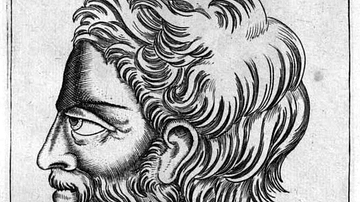
George Berkeley (1685-1753) was an Anglo-Irish bishop and an empiricist and idealist philosopher. He infamously claimed that no matter exists outside of God and that things only exist outside of our minds and perceptions because God perceives them. This extreme position, although not total scepticism, has drawn much criticism from other philosophers ever since. Berkeley's work continues to be studied for his cutting insights into the nature of philosophical enquiry and his insistence that philosophers not dream up world views that contradict common sense.
Early Life
George Berkeley was born on 12 March 1685 in Kilcrin near Dysert Castle in County Kilkenny, Ireland. Berkeley studied at Trinity College in Dublin where he received a B.A. degree in 1704. Three years later, Berkeley was made a fellow of the university. He joined the priesthood, being ordained into the Anglican Church in 1709. After a spell in London, Berkeley gradually worked his way up the church hierarchy. He was appointed the Dean of Derry in 1724.
Berkeley visited North America in 1728, staying in Rhode Island for three years. He had hoped to found a Christian college on the island of Bermuda, but when the government withdrew promised funding, this never became a reality. He did give both money and books to Yale University. In 1731, Berkeley returned to London and continued his philosophical enquiries into what exactly constitutes knowledge.
Berkeley's Philosophy of the Senses
Berkeley wrote on a wide range of topics from mathematics in The Analyst (1734) to cosmology in Siris (1744). He attacked atheists, sceptics, and scientists in his A Treatise Concerning the Principles of Human Knowledge (1710), Three Dialogues between Hylas and Philonous (1713), and De motu (aka On Motion, 1721).
Berkeley, like other thinkers such as John Locke (1632-1704), believed that perception through the senses is often unreliable and based on habit. He went even further, though, in works such as An Essay Towards a New Theory of Vision (1709), as here explained by N. Hampson:
Human perceptions were not automatic photographs, as it were, of an objective reality. The awareness of space and distance, for example, is not something communicated directly by the eye as lens. It depends on the interpretation of vision in terms of human organs and human experience and is therefore relative…According to Berkeley, the mind is aware only of its own perceptions and has no means of acquiring knowledge about the objects that are assumed to give rise to these perceptions…Berkeley…assumed that individual sense-impressions had an objective content that was guaranteed by God.
(98)

Despite his unconventional views on vision, Berkeley believed that objects are "a collection and succession in time of sensible qualities" (Berlin, 176), a point that the Scottish philosopher David Hume (1711-1776) agreed with. For Berkeley, sensations of size, colour, taste, smell, etc. can never be anything but a subjective reaction to the world. However, this is all we have in terms of knowledge of the world, what Berkeley calls "ideas" of the physical things around us. These ideas are in our minds, not in the perceived object. As an example, he suggests fire. We can perceive a fire with our senses, that is, see its colour and movement and feel its heat. If we put our hand into the fire, we will feel pain. Pain is not a part of the fire; fires do not feel pain. Pain is an idea (and a pretty sharp one) that only our mind creates. Another example would be pleasure, also a feeling that one finds difficult to assign to an object but not to the mind of the observer. A well-executed painting of an evocative landscape may give the viewer pleasure, but the painting itself does not contain pleasure. "Beauty is in the eye of the beholder" is a maxim Berkeley would have heartily approved of.
Berkeley gives a further demonstration of this separation of mind and object by noting that if one puts both hands in the same bowl of water but one hand was previously warmed and the other cooled, then the water would feel different to each hand. This, he says, demonstrates that the bowl of water does not carry both of the sensations but the mind does.
What is important for Berkeley is, in any case, not the individual ideas, the reactions of our senses, but the fact that the mind is working by putting these sensations together. The mind is an active agent, as opposed to the sensations themselves, which are only the passive result of the mind working. The philosopher R. H. Popkin summarises this position:
The entire, magnificent world of nature, with its wonderful scientific harmony is nothing but an expression of the ideas in the divine mind. As he suggested, the natural world was presented to us as a kind of sign language for interpreting God's mind.
(145)
Berkeley, is then, the purest of empiricists, although one could argue that in trying to show only the senses can give us knowledge he has arrived at such an extreme position that he has turned full circle and, in effect, converted his empiricism into metaphysics. He believes in the soul but concedes that we can never fully comprehend it. The soul and God can never be experienced through the senses but are known because we have an inherent "notion" of both God and our soul. We know the concepts of both an ever-present eternal being and ourselves as active thinking agents despite no sensory evidence of either. For Berkeley, God permits us to experience certain sensations based on our senses, but only God has true knowledge of all the sensations, and only God perceives everything.
Attacks & Criticisms
Berkeley, who called himself an immaterialist, frequently attacked other philosophers, particularly those who proposed the world was made up of unknowable or unseeable substances or matter. This meant that Berkeley was against a wide range of new ideas about things we can never see ranging from the metaphysical monads of Baruch Spinoza (1632-1677) to the theory of gravity proposed by Isaac Newton (1642-1727). Instead, "Berkeley sought to replace the appeals to unobservables with operational or functional definitions" (Yolton, 61).
Berkeley is sceptical of Locke's division of perceptions into primary qualities (general concepts such as size and shape we take from the physical world we experience) and secondary qualities (combinations of primary qualities which create specific imaginary objects, sometimes things that do not even exist in the physical world like a unicorn). Berkeley maintains that primary qualities can be imagined just like secondary qualities, and so there can be no such distinction.
Berkeley was himself criticised for creating a model of the world that he could not adequately explain beyond hopelessly vague terms like "ideas", "sensations", and "perceptions". Berkeley is seemingly an epistemological idealist, that is someone who denies the reality of the physical world since this only exists in the sense that we react to it with our senses. One criticism of Berkeley's "perception only" theory is the problem of things we do not perceive but which do certainly exist. An example is sound waves of too high or low a frequency for the human ear to perceive. These waves exist regardless of whether we perceive them or not. Berkeley countered this by saying that such things may well exist, but as we do not perceive them, they are simply not worth talking about, they are not relevant to our discussion (and Berkeley was particularly critical of philosophers who wasted time on irrelevancies). In short, if a tree falls in a forest and nobody is there to hear it, then the tree has fallen in silence. In Berkeley's world, perception is the key to existence or, as he put it himself in a now-famous phrase: esse est percipi or "the existence of things consists in their being perceived" (Popkin, 251).
One of the consequences Berkeley derives from his sensory/perception model is that all objects become ideas which are created by God. He reasons that if we do not perceive an object then somebody else must be perceiving it. Crucially then, Berkeley does not arrive at full scepticism (i.e. nothing at all exists outside of our minds) because he believed things do exist outside of our minds because they always exist in God's mind. That tree falling in the forest, for example, may not be perceived by us, but because it is always perceived by God, the tree does exist independently of us. Berkeley has thus achieved his aim of placing God back into philosophy. "Berkeley gives God a central, universe-sustaining role. The universe is kept in existence, while we do not observe it, by God's constant gaze" (Law, 150).
By reinserting God into philosophy, Berkeley is able to match common sense (for most people, it is pretty clear a particular tree exists) and to avoid some of the paradoxes sceptical philosophers often find themselves creating (like how can we have an idea of a tree if none exist?). For Berkeley, the important conclusion of his train of thought, nevertheless, is the bold position that mind is matter, they are not two separate things as other philosophers proposed.
Berkeley's ideas drew criticism from some of Europe's greatest minds. The German polymath Gottfried Wilhelm Leibniz (1646-1716) thought Berkeley went too far in his denial of reality. Leibniz noted that:
…much here…is correct and close to my own view. But it is expressed paradoxically. For it is not necessary to say that matter is nothing, but it is sufficient to say that it is a phenomenon, like the rainbow.
(Gottlieb, 172)
Many other thinkers otherwise sympathetic to an empiricist view of the world shared Leibniz's view. In short, Berkeley, found himself out on a limb on the great European tree of philosophy, or, as A. Gottlieb puts it, he became "the great eccentric of Anglophone philosophy" (171).
Major Works by Berkeley
The most important works by George Berkeley include:
An Essay Towards a New Theory of Vision (1709)
A Treatise Concerning the Principles of Human Knowledge (1710)
Three Dialogues between Hylas and Philonous (1713)
De motu (1721)
Alciphron (1732)
The Analyst (1734)
Siris (1744)
Death & Legacy
In 1734, Berkeley became the Bishop of Cloyne on the southern coast of Ireland and largely abandoned writing on secular philosophy. One of his chief interests in Cloyne was to try and persuade people of the potential health benefits of water fortified with pine tar. George Berkeley died in Oxford on 14 January 1753.
Berkeley might have philosophised himself full circle and become trapped by the very scepticism he was trying to avoid, but his great contribution to philosophy in general was to present challenges to other thinkers whose systems do not quite convince. Berkeley's own model, whatever its faults or even absurdities, does not detract from his sharp reasoning and critiques of other thinkers like Locke. Berkeley had some particularly pithy comments to make about philosophers who spend vast amounts of time and paper trying to convince people of what is patently obvious, mere common sense. Alternatively, unwary philosophers, he warns, can be guilty of the paradox of "doubting of those things which other men evidently know, and believing those things which they laugh at and despise" (Popkin, 245).
Berkeley's position that only minds exist and there is no matter led to other, later philosophers rejecting the God part of his theory and leaving only minds, to be precise, just one mind, you, the reader of this article. This philosophy is what we today call solipsism, the belief that the only thing that exists in the universe is oneself and one's ideas. Ironically, this is the very scepticism that Berkeley had warned philosophers of his own period would produce if they persisted with their baffling theories which had no place for God.








